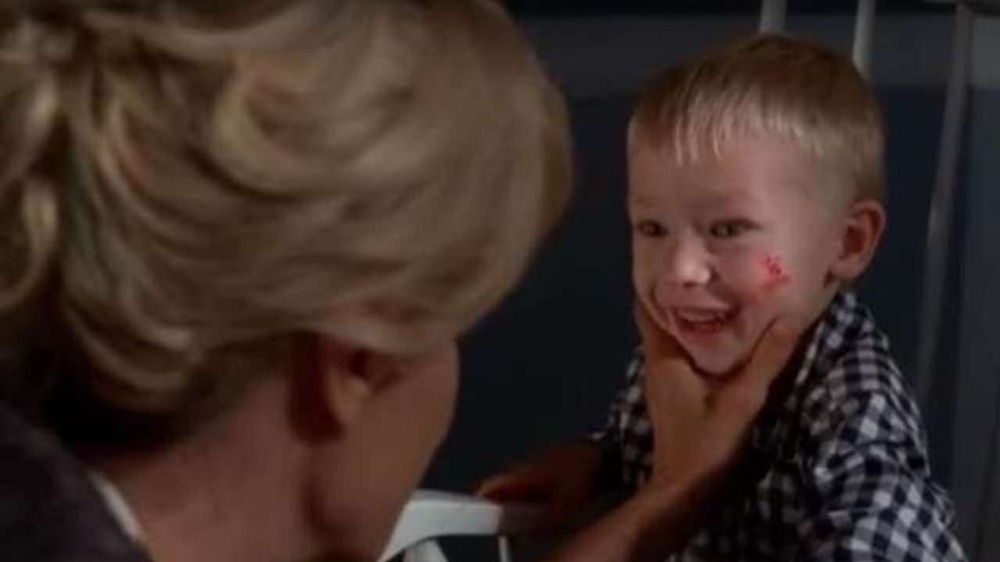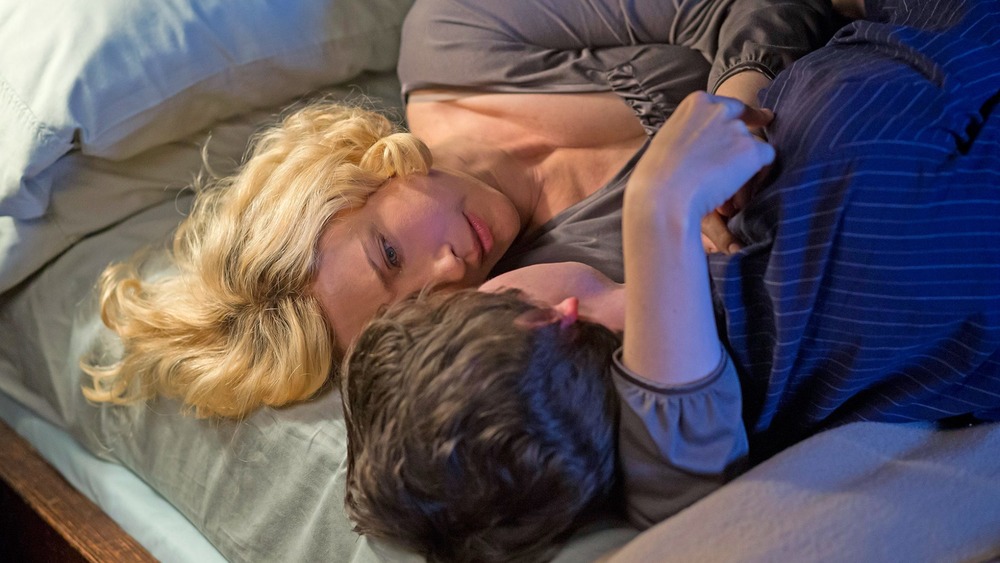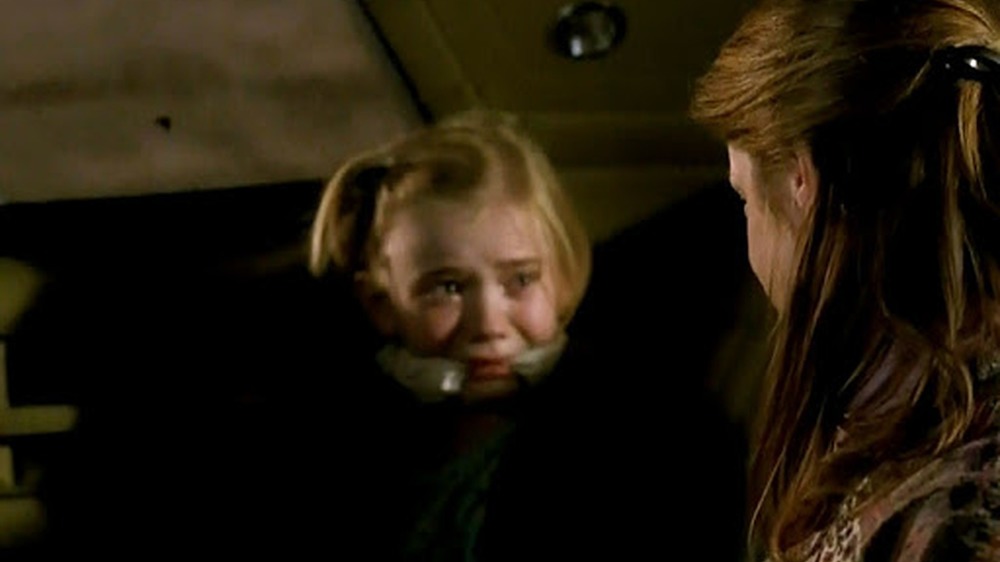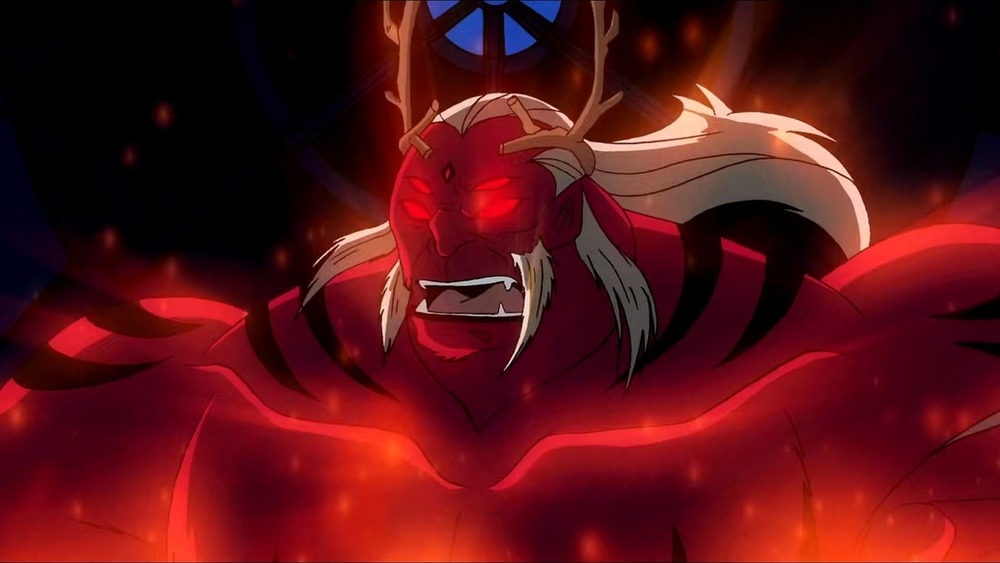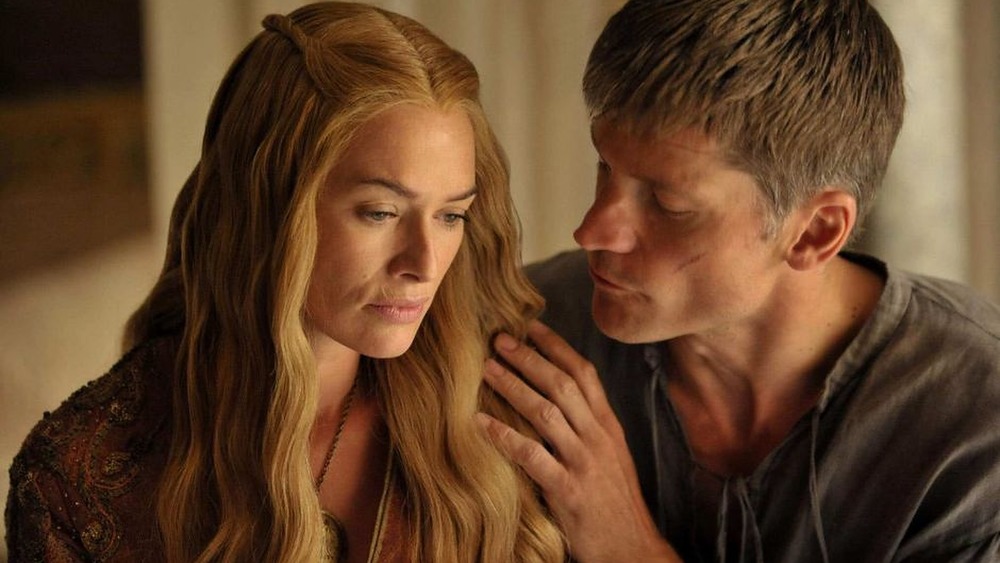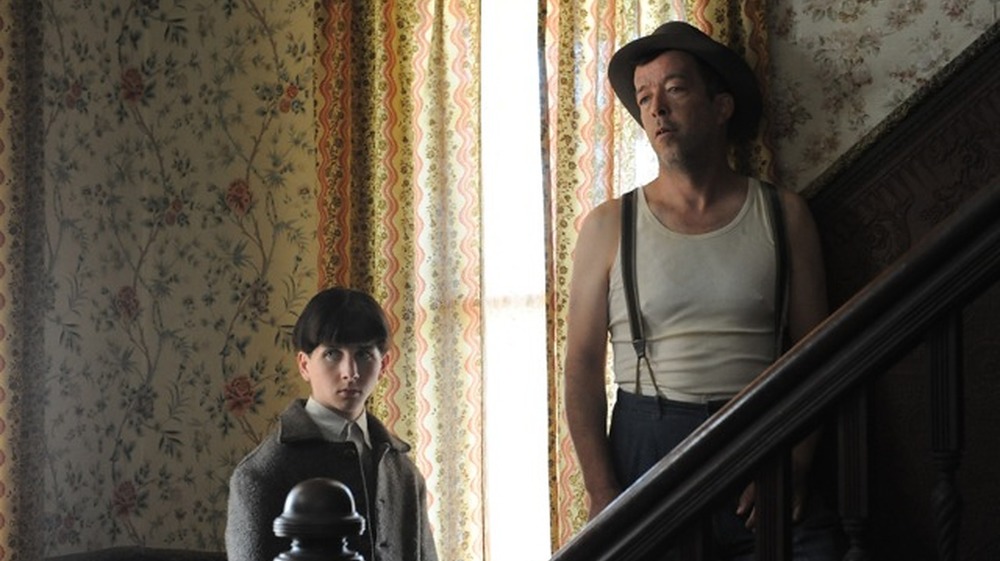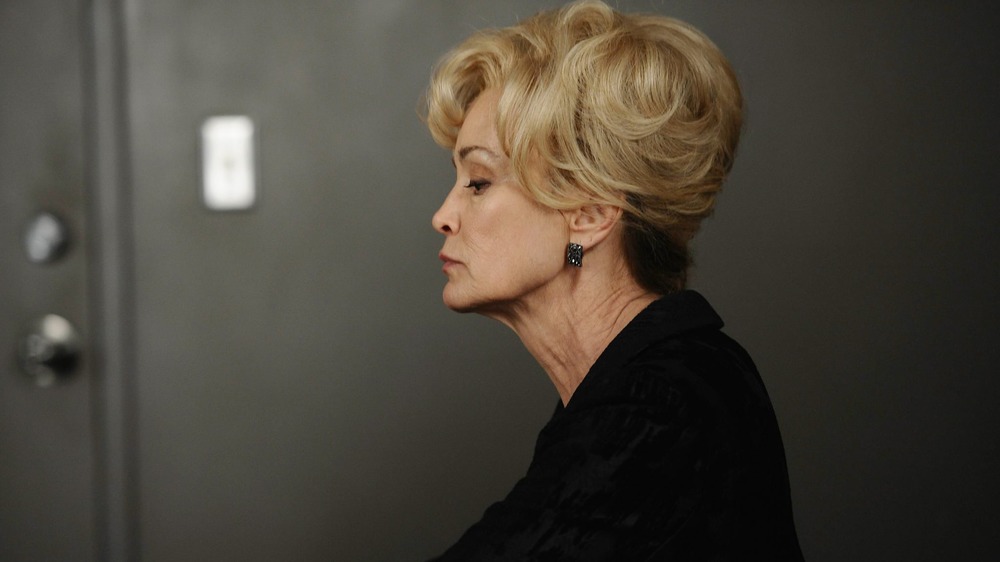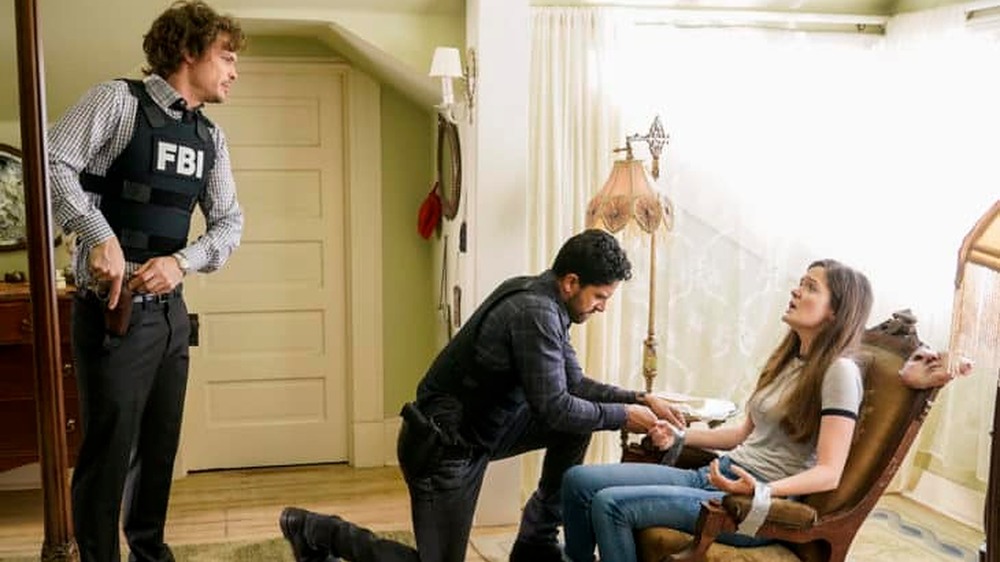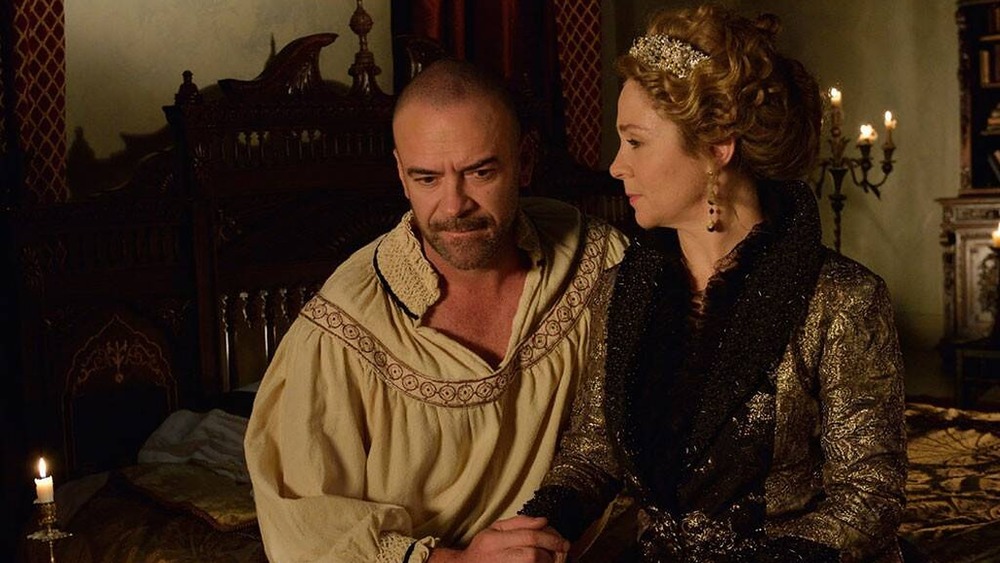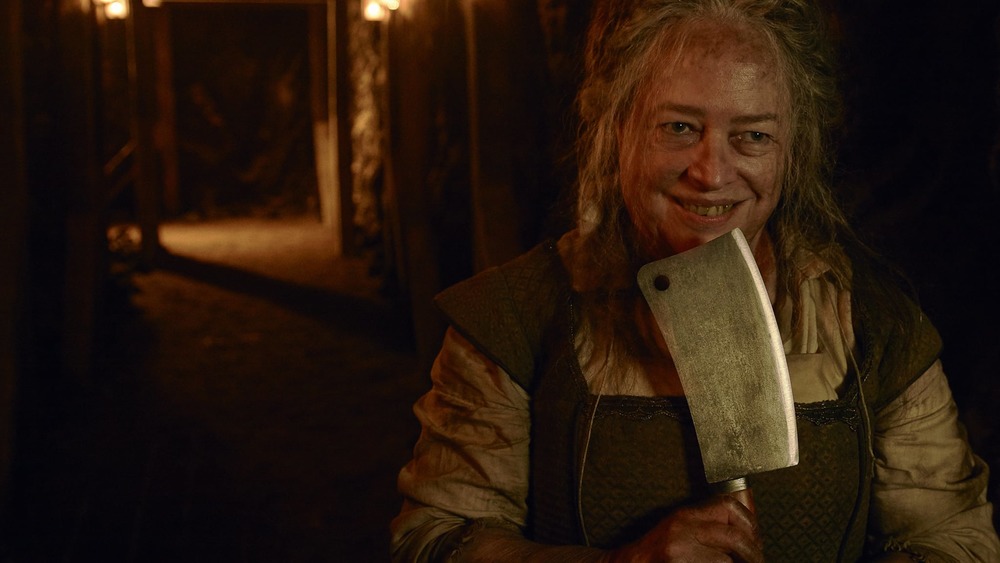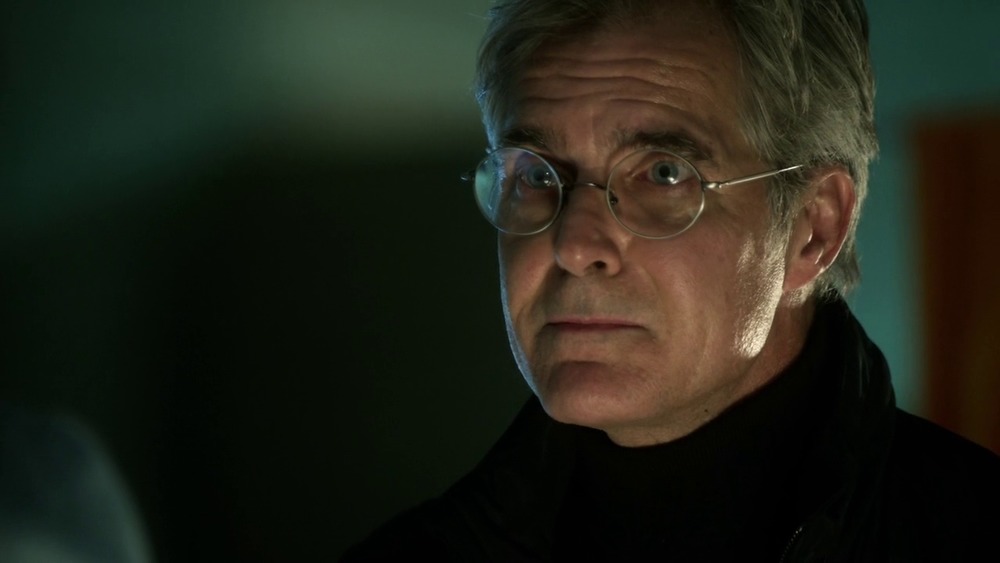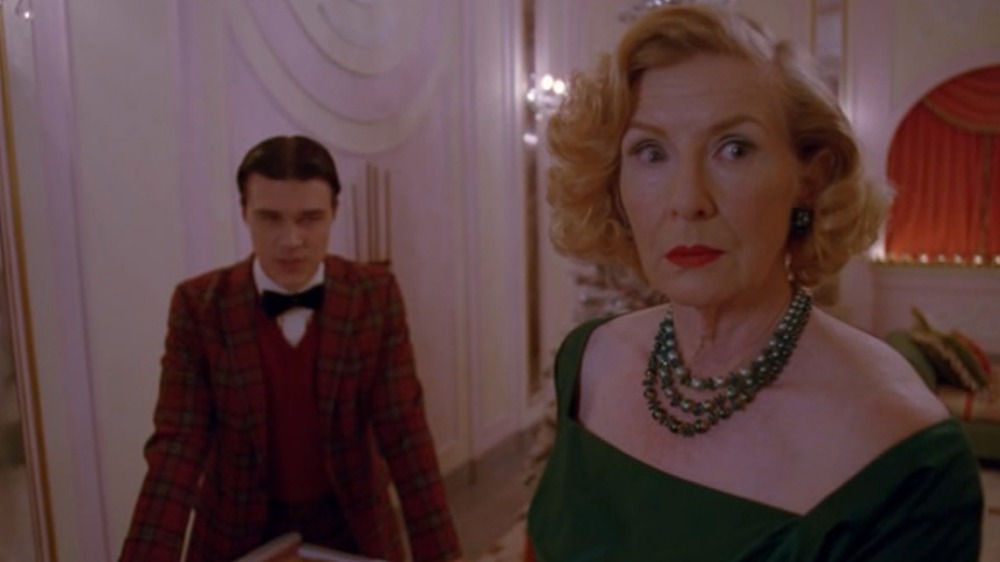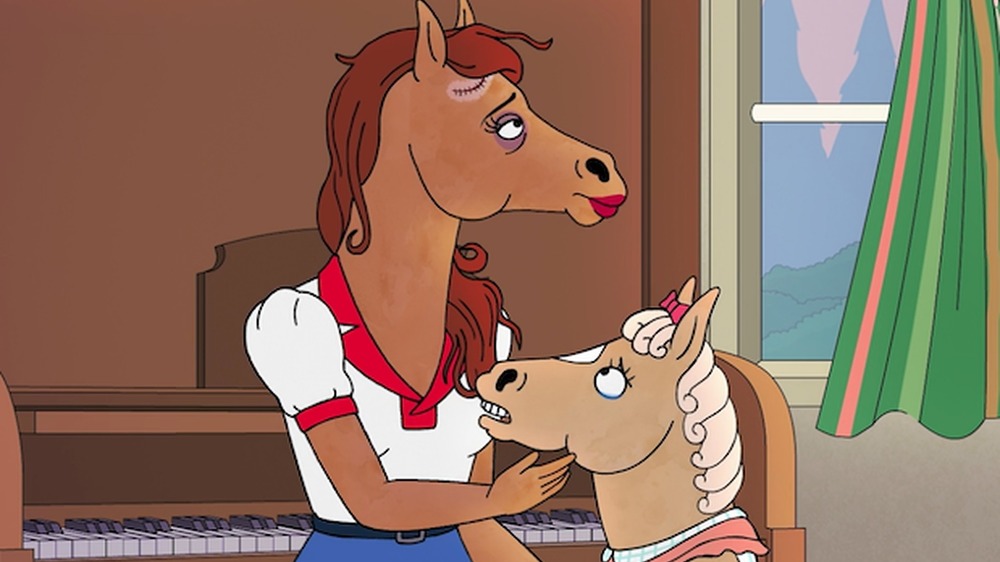The Creepiest Parents In TV History
Most kids go through a phase where they don't get along with their parents. Later in life, they'll probably admit that their reasons may have been a little misguided and that they now understand why their caregivers didn't let them just eat cake and play video games all day. The adolescent antagonism many of us feel toward authority figures wanes as we grow up, and we realize that most of our parents were just trying their best.
But this isn't always true for a thankfully small minority of parents who, whether they are interdimensional demons or serial killers, are just plain creepy — and sometimes downright evil. While they make for interesting plot and character development, these elders would be a nightmare in real life. When we see them on television, we can breathe a sigh of relief that all we ever had to stomach was a full serving of vegetables or an early curfew, rather than jailbreaks or poisonings.
Norma Bates in Bates Motel
One might assume that the most unnerving versions of Norma Bates present in the 1959 novel Psycho by Robert Bloch or the film adaptation directed by Alfred Hitchcock in 1960. In the original story, we first meet Norma through Norman Bates, whom we hear arguing with her and who describes her as a mentally ill, controlling mother. This, of course, is not the real Norma: The real one is a mummified corpse murdered by Norman, who has taken on her identity as an alternate personality.
Norma's backstory, though, as told through the A&E drama Bates Motel, is just as creepy and even more tragic. Norma isn't necessarily a bad parent but rather an unhealthy one, whose codependence and personal trauma leak along both nature and nurture tracks into the budding psychopathology of her son. The unsettling sense that arises from her character is due to the fact that she knows her son is mentally unwell and homicidal and constantly attempts to protect him — often from himself — through duplicitous means, no matter the cost to others. Her obsessiveness often harms Norman as much as it helps.
Her protective nature is not purely maternal, either, and has sexual undertones that will ultimately lead Norman to kill her out of jealousy. The rabid drive for preservation of their "normal" leads her to become so controlling and unhinged that even after her death, she remains a malevolent presence in Norman's mind that ultimately coaxes him toward his infamous killings.
Sylvia in Criminal Minds
What's scarier than a serial killer? A whole family of them. And just like Norma Bates, the matriarch of the Romani family in the 2009 Criminal Minds episode "Bloodlines" has a complicated history that inspires empathy as much as it does fear. Sylvia's role in the family and the crimes they perpetrate is a chilling manifestation of her Stockholm syndrome.
Sylvia was once known by the name Kathy Gray, until her parents were murdered and she was abducted by a Romani family that had spread internationally over the course of decades, stealing young girls as wives for their sons. Sylvia, despite the trauma of her captivity, came to regard the family as her own, even taking part in the ritual of finding a wife for her own son — which required orphaning and kidnapping a young girl in exactly the same manner as her own initiation into the family years ago.
The creepiest thing about Sylvia isn't that she participates in such inhuman traditions or leads a family of murderers but that she does so despite the fact that this family and these rituals were responsible for the death of her own parents. To identify with one's tormentors to this extent is a shockingly deep portrayal of the bonds of Stockholm syndrome.
Raven's father, Trigon, on Teen Titans
Nobody's parents are perfect, but Trigon, the inter-dimensional demonic personification of pure evil bent on taking over the universe, is the exact opposite. Not only does he threaten to subjugate and corrupt the entire world, but he is seen to corrupt his daughter as well, torturing her mentally until she grows to believe that she is as evil as he is.
Trigon's myriad supernatural abilities are terrifying. He is able to leave a mark on the dead that brings them back to life as his servants, turn people to stone, and even manifest a "dark side" form of any living being, as he does when he turns the dark versions of the Titans against themselves.
The demon certainly makes a habit of using his enemies as a weapon against themselves and thus a tool in his plans. His daughter, Raven, is no exception. Not only did he corrupt her and force her to serve as his portal to the mortal world, but he regressed her to her nine-year-old form, a further act of psychological manipulation that reasserted his dominance as well as his vileness next to her innocence. A massive horned demon with four red eyes, Trigon takes creepy to a cosmic level.
Cersei and Jaime Lannister in Game of Thrones
Joffrey's personality alone should have been evidence enough that something wasn't right with the union of Cersei and Jaime Lannister. Their relationship led them to commit unspeakable acts that harmed many innocent people and was tainted from the beginning by the prophecy of Maggy the Frog, a wood witch who cryptically revealed to Cersei that she would have only three children while her husband would have 20 and implied that she would live to see each of her children die before her. Her motherhood was cursed before it even began.
Misfortune certainly seemed to follow Cersei and Jaime's depraved escapades, and the clandestine nature of their relationship and meetings only adds to its darkness. Ultimately, the secret would get multiple people killed. Cersei's discontent with her marriage to Robert Baratheon leads her to commission his poisoning, and his death is the impetus for the dreadful War of the Five Kings. More directly, Cersei saw to the death of two Hands of the King who had known of their adulterous relationship, and Jaime pushed Bran out of a tower, paralyzing him, when he accidentally stumbled upon them. The Lannister twins are a terrifying set of parents, partly because of their disturbing origins but mostly due to the fact that they each share the remorseless, murderous cunning of a Lannister — and their union leaves bodies in its wake.
The Whitmans in Mad Men
The AMC drama Mad Men is astutely named, according to both armchair experts and actual experts, who have taken it upon themselves to analyze Don Draper, born as Dick Whitman. Under a dead man's name, Dick has become a boozy, deceptively charming, secretly poor-humored and abusive creative director, husband, and father. Some say he's a sociopath. Others say he's simply an abused child recovering from his trauma.
Whatever the case, Dick/Don is clearly something of a madman, and through a series of revelations, the series makes it clear that his family and upbringing are largely the cause. The creepiness that inspired his destructive idiosyncrasies is so alarming that he has buried it deep in his subconscious, from whence it can only return in disquieting flashbacks.
As the illegitimate child of a sex worker who died in childbirth, he drew intense hatred from his father's wife, a cold specter haunting every moment of his childhood. He watched his father, an alcoholic and emotionally distant man, die after being kicked in the head by a horse, after which his stepmother took up with a new man who owned a brothel. While living there, he was taken advantage of by one of the female workers, and as if that weren't traumatic enough, his stepmother beat him for it in public. The hate in her eyes for a confused and lonely child is enough to make your blood run cold.
Constance and Tate Langdon in American Horror Story
The poor Langdon family was doomed from the start, and we may never know if their fates were predestined or carved out by the dark influence of the Murder House. Constance Langdon is neglectful and often bitter toward her children, three of whom were born with physical defects and one of whom, Tate, develops into a sociopath. Her cold, austere presence no doubt influenced both the inherited and learned aspects of his transformation into a monster. She herself murdered her husband for cheating on her, leading Tate to believe that his father abandoned the family.
Tate himself later became a parent and propagates the family deviance tenfold. After committing a mass shooting at his high school and being killed in the Murder House by a SWAT team, he resides in the Murder House as a ghost and eventually assaults and impregnates current living inhabitant Vivien Harmon, who gives birth to Michael: the anti-Christ. This sinister entity was brought into being in part by Tate's disturbed nature, coupled with the fact that the union that created him was that between a human and a ghost, which is about as creepy as parents get.
The Chameleon on Criminal Minds
While some of these creepy parents may be neglectful, Everett Lynch on Criminal Minds, also known by his serial killer alias The Chameleon, takes time for father-daughter bonding. Well, he used her in his schemes as a con man, anyway. Until he killed her and cut off her face.
Before that, though, Lynch was anything but an award-winning father. He learned the art of the con from his own mother (there's certainly a multigenerational trend in many of these stories), using his skills to manipulate women and secure their money and, often, their faces. His daughter Grace works with him on his schemes, and although the extent to which she is privy to his deviant affairs is unclear, she has been seen asking him not to hurt at least one of their potential con targets.
Lynch helps his daughter escape from a federal prison after manipulating a doctor into providing him with a false identity. The Chameleon's manipulation of the doctor extends so far as to push him to the point of becoming a serial killer himself. Creating killers seems to be something Lynch excelled at, as his daughter killed the Foster family to impress him. But it wasn't enough. One of the creepiest dads in history killed her shortly after.
Catherine de' Medici on Reign
Catherine de' Medici has probably poisoned more meals than she's eaten in Reign. She deals in secret passageways and fortune tellers and always knows more about what's going on than anyone else in the room.
What's most terrifying about Catherine is that she's always planning to have someone killed — and she absolutely has the means and emotional constitution necessary to follow through with her plots. Her first target was Mary, and then she set her sights on her husband's bastard child Bash. Despite her lack of success in both of these schemes, everyone in the castle knows to fear her, and death seems to follow Catherine wherever she goes. Her illegitimate firstborn was deformed and exiled to the castle tunnels, where her goings-on were chalked up to some "castle ghost." This child, Clarissa, appears menacingly in the shadows on multiple occasions and is eventually killed. Catherine's son Francis also suffers a tragic death, and she is also haunted by the ghosts of her twin children, who were murdered as infants.
Catherine is a character mired in evil, both of her own making and that which unjustly befell her. The trope of the threatening mother-in-law is a common one, but this exploration packs a particular punch.
Thomasin White on AHS: Roanoke
If your mother is also known as The Butcher, it seems like you drew the short end of the parent stick. In the case of Thomasin White on American Horror Story: Roanoke, though, she may never have become such a violent and terrifying entity if it weren't for the betrayal of her son. Her backstory is tragic: She was the wife of the leader of the Roanoke colony, left in charge when her husband John went off for supplies. A group of rogue colonists wanted to relocate the colony for the winter and, at her refusal, placed her in a witch's bridle (a mask of torture and humiliation) and banished her into the woods to starve.
Her son Ambrose was among the mutineers.
In the woods, though, a witch named Scáthach saved Thomasin from an advancing wild boar, offering her the boar's heart to eat in exchange for her soul: Consuming the heart gave her strength, and she returned to the settlement to slaughter those who had betrayed her. She spared her son at first and moved the colony inland, but he mounted another rebellion, protesting against her and the child sacrifices she committed at the behest of Scáthach. Eventually, she killed her son and the entire colony, forever tethering their souls to the now-haunted land ... which means that she took the disciplinary measure of "grounding" her insubordinate son to a whole new level.
The Toyman on Supergirl
Do you remember not getting the toys you wanted for Christmas? If you got upset at your parents over this, you might want to reconsider, because having the Toyman from Supergirl as a parent makes disappointing Christmas mornings look like child's play. This villain is the father of Winn Schott, Kara Danvers' close friend, and a toy-maker by trade until he put a bomb inside a teddy bear and sent it to his boss, eventually causing the deaths of six people and resulting in his own incarceration.
In the current world of Supergirl, the Toyman escapes from prison by killing three guards with a bladed yo-yo and then uses a series of creepy and cryptic toy gadgets to terrorize Winn, Supergirl, and the FBI agents charged with apprehending him. Ultimately, he tries to use Winn in his revenge plan against his former boss.
The Toyman gives off plenty of "creepy doll" vibes, using puppets and dolls in his schemes and manipulations. He enjoys psychological torment and executes it with chilling ease. He's not the sort of father you want to play with.
Gloria Mott and Dell Toledo in AHS: Freakshow
The 2014 fourth season of American Horror Story, subtitled Freak Show, is full of off-putting family dynamics that ultimately escalate into disturbing violence. Gloria Mott is an example of the dysfunction that pervades the world we strive to delineate as normal. Her obsession with high status trickles down into her spoiling and enabling of her petulant son, who is grown but acts like a child due to this dynamic.
After the death of her father, Gloria married her second cousin just to maintain her elite lifestyle. Her subservience to her son Dandy is unsettling, bordering on hysteria, and like Norma Bates, she turns a blind eye to his debased actions. (She did send him to his room for murdering their housemaid ... but then covered up the murder.) In the end, Dandy's crimes include Gloria's own murder. And bathing in her blood, which might not be a crime but is the cherry on top of her disconcerting portrayal of motherly delusion.
While it was Gloria's devotion that led to her maladapted relationship with her son, Dell Toledo's relationship with his son Jimmy was distorted for the opposite reason. When he and his wife were penniless, he sold tickets to his own son's birth, attempting to charge for the chance to hold the "monster baby," born with deformed hands. Dell would eventually attempt to kill Jimmy in his sleep, as well as murder or attempt to murder multiple other people.
The Sugarmans in BoJack Horseman
Netflix's tragi-comedy BoJack Horseman poses the same question season after season: Why is the titular character like this? In partial answer, the series points us toward BoJack's abusive parents and even further to his maternal grandparents. Beatrice Sugarman tells BoJack at one point that he has inherited the "ugliness inside," that he was born broken. That little monologue alone might make her a candidate for creepiest parent, but what she endured as a child was even worse.
It was undeniably trauma that made the heiress to the Sugarman Sugar Cube fortune the formidable and abusive mother she was. After Beatrice's older brother Crackerjack died in World War II, her mother went mad with grief, forcing a too-young Beatrice to drive her home after she had a public, drunken breakdown. Her father was emotionally detached in the creepy, idyllic manner characteristic of the first 20 minutes of a horror film. Not only did he force Beatrice to watch her cherished possessions being burned after her bout with scarlet fever in one stomach-turning memory, but he coerced Beatrice's mother Honey into getting a lobotomy to deal with her grief over Crackerjack's death. If Beatrice showed any emotion at these traumatic events, her father would cheerfully demean her and tell her she should shut down these emotions unless she wanted to end up like her mother — whose last words, spoken absently in near catatonia as her fingers hovered lifeless over her once-beloved piano, were, "Why, I have half a mind..."
